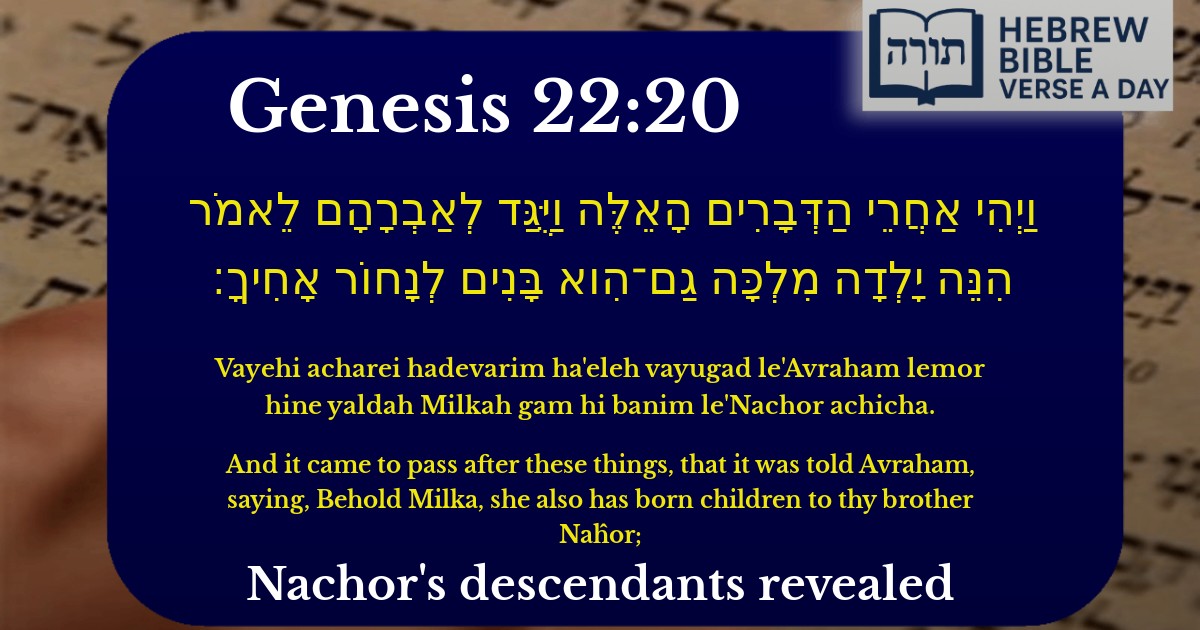Join Our Newsletter To Be Informed When New Videos Are Posted
Join the thousands of fellow Studends who rely on our videos to learn how to read the bible in Hebrew for free!
Hebrew Text
וַיְהִי אַחֲרֵי הַדְּבָרִים הָאֵלֶּה וַיֻּגַּד לְאַבְרָהָם לֵאמֹר הִנֵּה יָלְדָה מִלְכָּה גַם־הִוא בָּנִים לְנָחוֹר אָחִיךָ׃
English Translation
And it came to pass after these things, that it was told Avraham, saying, Behold Milka, she also has born children to thy brother Naĥor;
Transliteration
Vayehi acharei hadevarim ha'eleh vayugad le'Avraham lemor hine yaldah Milkah gam hi banim le'Nachor achicha.
Hebrew Leining Text
וַיְהִ֗י אַחֲרֵי֙ הַדְּבָרִ֣ים הָאֵ֔לֶּה וַיֻּגַּ֥ד לְאַבְרָהָ֖ם לֵאמֹ֑ר הִ֠נֵּ֠ה יָלְדָ֨ה מִלְכָּ֥ה גַם־הִ֛וא בָּנִ֖ים לְנָח֥וֹר אָחִֽיךָ׃
וַיְהִ֗י אַחֲרֵי֙ הַדְּבָרִ֣ים הָאֵ֔לֶּה וַיֻּגַּ֥ד לְאַבְרָהָ֖ם לֵאמֹ֑ר הִ֠נֵּ֠ה יָלְדָ֨ה מִלְכָּ֥ה גַם־הִ֛וא בָּנִ֖ים לְנָח֥וֹר אָחִֽיךָ׃
🎵 Listen to leining
Parasha Commentary
📚 Talmud Citations
This verse is not quoted in the Talmud.


Context and Significance of the Verse
The verse (Bereishit 22:20) follows the narrative of the Akeidah (Binding of Isaac) and introduces a genealogical report about Avraham's brother, Nachor. Rashi explains that this news was given to Avraham to console him after the great trial of the Akeidah, as it informed him that Rivka (Rebecca)—his future daughter-in-law and the matriarch of the Jewish people—had been born into Nachor's family. This sets the stage for the subsequent marriage of Yitzchak (Isaac) to Rivka.
Milka's Children and Their Role in Jewish History
Milka, Nachor's wife, bore children who would play a role in the lineage of the Jewish people. The Midrash (Bereishit Rabbah 57:3) notes that the phrase "גם היא" ("she also") hints that just as Sarah bore Yitzchak, Milka bore Rivka, indicating divine providence in ensuring the continuity of Avraham's spiritual legacy.
The Timing of the News
The Ramban (Nachmanides) observes that the phrase "ויהי אחרי הדברים האלה" ("And it came to pass after these things") connects this announcement to the Akeidah, suggesting that Avraham's unwavering faith was rewarded with tidings of future generations. The Sforno adds that this was a reassurance that Avraham’s descendants would indeed become a great nation, as promised by Hashem.
Nachor’s Family and Their Spiritual Status
The Talmud (Bava Batra 91a) discusses Nachor’s descendants, noting that while some remained idolaters, Rivka emerged as a righteous woman. This underscores the idea that even within a family of mixed spiritual legacies, individuals can rise to greatness through their own merits.